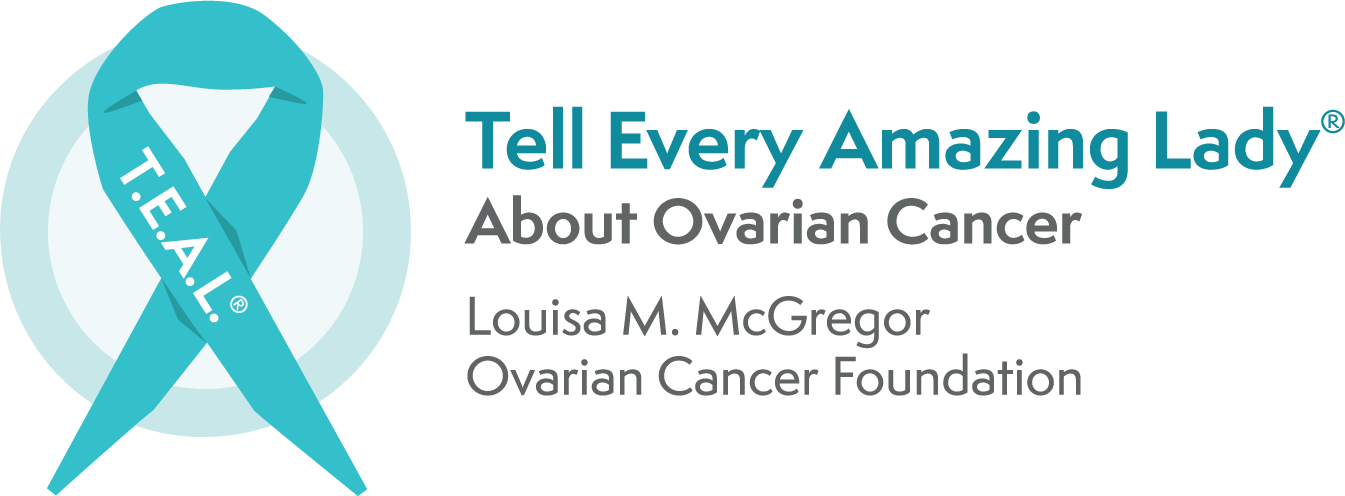LGBTQ+
Resources and More

Addressing Our Name
T.E.A.L.® stands for both Tell Every Amazing Lady About Ovarian Cancer Louisa M. McGregor Ovarian Cancer Foundation and for teal, the color that symbolizes ovarian cancer. Our goal is to promote public awareness and education of the signs, symptoms and risk factors of ovarian cancer while providing support to survivors and raising funds for research in order to find a screening test and cure for ovarian cancer.
T.E.A.L.® is committed to supporting all people at risk for ovarian cancer. People with ovaries may identify as non-binary, male, intersex, agender, genderfluid, etc. Also, though a woman may have ovaries, there are also women that do not have ovaries. A person’s reproductive/sex anatomy does not determine their gender identity or pronouns. Whether you have or had ovaries, it is always best to talk to a cancer specialist about your individual risk. T.E.A.L.® is dedicated to helping people with ovaries identify the signs and symptoms of ovarian cancer, utilize available resources, and seek out treatment and management options.
Healthcare Disparities
According to the CDC, social determinants of health are “conditions in the places where people live, learn, work, and play that affect a wide range of health and quality-of-life-risks and outcomes.” LGBTQ+ community member’s risk of ovarian cancer, as well as other cancers, may be increased by determinants of health including:
• Discrimination in access to quality health insurance, employment, housing, etc.
• Lack of providers who are knowledgeable about LGBTQ+ health care
• Lack of academic research on ovarian cancer in LGBTQ+ people
While addressing these issues involves completely dismantling the systems and structures of our society today, there are ways you can report discrimination. Out to Enroll offers support through an open email inbox, as well as resources for finding health insurance, finding a doctor, and reporting discrimination.
Your Risk
On top of other risk factors due to social determinants of health, there are other experiences that decrease risk of ovarian cancer that members of the LGBTQ+ community are less likely to have. These include taking oral contraceptives and going through pregnancy and chest feeding. These factors that contribute to disparities mean that it is extra important for people who are LGBTQ+ to have resources available to them and have access to consistent, quality health care.
If you are at risk of ovarian cancer, T.E.A.L.® has a list of symptoms, risks, and information about testing.
If you are seeking more information on how ovarian cancer affects transgender, nonbinary, and intersex people, visit the Ovacome blog for resources and tips.
If you are looking for more information on how ovarian cancer risk affects transgender men, please visit the National LGBTQ Cancer Center for more resources.
Finding Resources
Finding support and providers you can trust can be difficult to navigate. However, there are national websites that are specifically in place to make this process easier.
KEY:
National Support
Human Rights Campaign
The Human Rights Campaign is based in Washington, D.C., where they fight for LGBTQ+ equality. On their website you will find a copy of the Healthcare Equality Index, which highlights healthcare providers that are equitable and provide inclusive care for LGBTQ+ individuals.
GSA Network
GSA Network is a student-run organization that is based in schools around the U.S. GSA Network started as a way for young LGBTQ+ youth to come together and create safe spaces. They have since grown into a huge vehicle for social change. Their website provides youth-specific LGBTQ+ resources.
Queer Health Access
Queer Health Access’ mission is finding competent, safe healthcare services for members of the LGBTQ+ community. Their website has resources like sexual education, cancer-related questions, links to healthcare service facilities that have been approved to ensure safe care for members of the LGBTQ+ community, and more.
The LGBTQ Cancer Network
The LGBTQ Cancer Network works to educate the LGBTQ+ community on increased cancer risks and trains healthcare providers to offer more safe and welcoming care. They have various resources on their website concerning healthcare providers, treatment providers, and cancer screening providers.
WPATH
WPATH or World Professional Association for Transgender Health, has an abundance of service providers they trust as well as general resources and recommended reading.
HealthSherpa
Health Sherpa is based in San Francisco and works to help you find your most affordable healthcare plan by locating providers right in your neighborhood. They claim that 4 out of 5 people find a plan for $10 a month or less. Health Sherpa works hard to make a difficult system a little easier by educating people on healthcare and helping people enroll with ease.
GLMA
GLMA: Health Professionals Advancing LGBTQ Equality is an organization of lesbian, gay, bisexual and transgender (LGBT) health professionals. Their provider directory can help you find a safe and convenient healthcare provider in your area.
MyTransHealth
MyTransHealth is an organization that also screens health providers in order to create a list of quality healthcare services.
Sage
Sage is a nationwide organization that focuses on making aging better for LGBTQ+ people nationwide. Their website has resources for caregiving providers, discrimination help information, and financial and legal assistance.
Local Support in the NYC Boroughs
The Center
The Center is a safe space for members of the LGBTQ+ community. They provide services that circle around their core mission which is recovery, wellness, family and youth. They have an abundance of resources ranging from adoption or foster care options, to mental health and wellness. They have a list of LGBTQ+ friendly businesses, hotels, employment, food resources, and they even have hotlines available.



